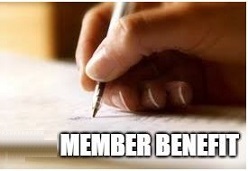 Member Benefit #9
Member Benefit #9
As a NAIWE member, you may guest post on the NAIWE blog. Articles should be between 500 and 1,250 words and of interest to our members. All guest posts will include a member byline and a link to the member’s active NAIWE website.
Visit the NAIWE website to see all of the member benefits.

 We encourage everyone in the publishing industry to belong to two professional organizations. The first is a large, general, career-building association such as NAIWE, and the second is a smaller craft- or genre-focused association that will help develop additional skills in the minutiae of your craft.
We encourage everyone in the publishing industry to belong to two professional organizations. The first is a large, general, career-building association such as NAIWE, and the second is a smaller craft- or genre-focused association that will help develop additional skills in the minutiae of your craft.
 We wanted to get to know Jeanne Grunert (
We wanted to get to know Jeanne Grunert (
 Proofreading is usually performed on a manuscript that has already been through developmental editing or copyediting and has been laid out by a designer into page proofs. It provides a last review of egregious errors, such as basic grammar, punctuation, spelling, and inconsistencies, and any other errors that were introduced during the design process. Proofreaders may also check copy for conformity to type specifications and the style sheet and ensure attractive typography by checking kerning (spacing between characters), margins, word spacing, repetitive word breaks, and the like.
Proofreading is usually performed on a manuscript that has already been through developmental editing or copyediting and has been laid out by a designer into page proofs. It provides a last review of egregious errors, such as basic grammar, punctuation, spelling, and inconsistencies, and any other errors that were introduced during the design process. Proofreaders may also check copy for conformity to type specifications and the style sheet and ensure attractive typography by checking kerning (spacing between characters), margins, word spacing, repetitive word breaks, and the like. We wanted to get to know Suzanne Sherman (
We wanted to get to know Suzanne Sherman ( It is amazing that there are so many types of people in the publishing industry! While there are many people who love words, as to be expected, there are also many other people with a variety of other loves related to the written word.
It is amazing that there are so many types of people in the publishing industry! While there are many people who love words, as to be expected, there are also many other people with a variety of other loves related to the written word. This summer, NAIWE is challenging you and your fellow NAIWE members to be the best version of yourselves. You may personalize this challenge to fit your needs and summer goals. Choose a book to read that you classify as a self-help book even though its genre is far from that. Choose a project that has been nagging at you but will also produce great reward upon completion. And finish the challenge by spending some quality time with our experts learning how they mastered creating multiple steams of income. Throughout the challenge, be true to yourself and your goals!
This summer, NAIWE is challenging you and your fellow NAIWE members to be the best version of yourselves. You may personalize this challenge to fit your needs and summer goals. Choose a book to read that you classify as a self-help book even though its genre is far from that. Choose a project that has been nagging at you but will also produce great reward upon completion. And finish the challenge by spending some quality time with our experts learning how they mastered creating multiple steams of income. Throughout the challenge, be true to yourself and your goals!